As the #MeToo and #TimesUp campaigns increase the pressure to address sexual discrimination and harassment, MTV and the Public Religion Research Institute (PRRI) have teamed up to produce a comprehensive assessment of young people’s attitudes about social issues. The data offer some surprising insights into the Millennial generation especially with regard to political participation and some not surprising differences between the sexes.
It is not surprising that the MTV/PRRI report finds that 38 percent of young women but only 17 percent of young men feel constrained by gender stereotypes. Although today’s young people are the most diverse cohort in our history, there are no significant differences across racial and ethnic lines: 40 percent of young black women, 39 percent of young Hispanic women, and 36 percent of young white women feel limited by gender stereotypes.
Notably, young women don’t see young men the way these men see themselves. While only 26 percent of young men say they feel a great deal of pressure to conform to traditional ideas of masculine behavior, 39 percent of young women believe that young men feel this pressure. In this case, race and ethnicity make a difference: 47 percent of young black women and 46 percent of young Hispanic women say that men feel intense pressure to conform, compared to 33 percent of young white women. About six in 10 young women say that this pressure leads young men to treat women as weaker and less capable; only four in ten men agree. 54 percent of young women say this stereotype encourages sexually aggressive behavior among men, compared to only 37 percent of young men.
The report finds that most young people see a double standard in the employment market: 68 percent believe that women must be more qualified than men to compete successfully for the same job. Here, gender makes a difference: 81 percent of young women perceive a double standard, compared to only 55 percent of young men. Race and ethnicity matter too: while 69 percent of young black men and 62 percent of young Hispanic men see women at a disadvantage in the labor market, young white men are divided 51 to 49 percent. These findings suggest that the discrimination young men of color experience in the job market makes them more likely to empathize with women, whom they see as receiving unfair treatment as well
Although large majorities of young men and young women reject the proposition that discrimination against men is as big a problem as discrimination among women, there are signs of discontent among young men, 42 percent of whom say that women use gender as an excuse when they don’t get what they want from the labor market. Almost half of young men without high school degrees express this view, compared to only one quarter of young men with college degrees.
Surprisingly, a majority of young people have negative feelings about the marches and demonstrations that have occurred around the country since Donald Trump’s election. Only 36 percent regard them as inspiring, powerful, or effective, compared to 55 percent who view them as pointless, counterproductive, divisive, or violent. These negative impressions are particularly prevalent among young whites, while African Americans, Hispanics, and Asian/Pacific islanders are more evenly divided.
This said, one of the biggest take-aways from this poll is that gender affects the likelihood that young people will become politically involved. Young women are more likely than young men to report one or more kinds of political activity over the past 12 months, and the differences are significant in virtually every category, from online participation to volunteering for a cause to attending a public rally or demonstration. This may be the first time in American history that an entire cohort of young women reports greater political engagement than their male peers. If so, this could presage a new wave of female activism that shifts the course of our politics in the 2018 mid-term elections and beyond.
Update:
On January 10, Gallup released a new report documenting a substantial rise in Americans’ discontent with the position of women in U.S. society. 37 percent espoused this sentiment in 2018, compared to 26 percent in 2008.
All of the change occurred among Democrats. 43 percent of Democratic men were unhappy about the status of women, compared to 29 percent a decade earlier. Discontent among Democratic women moved even more, soaring from 38 percent to 62 percent. Meanwhile, sentiment among Republicans did not budge: 15 percent of men and 18 percent of women expressed discontent in both 2008 and 2018.
Taken together with the MTV/PRRI survey, these findings suggest that Democratic women are poised to become the leading edge of calls for fundamental change in the treatment of women in U.S. society. The political effects of their mobilization in the 2018 midterms and beyond will be one of the major story-lines for analysts during the next few years.
The Brookings Institution is committed to quality, independence, and impact.
We are supported by a diverse array of funders. In line with our values and policies, each Brookings publication represents the sole views of its author(s).

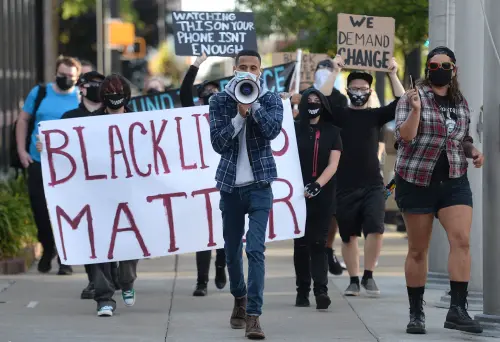
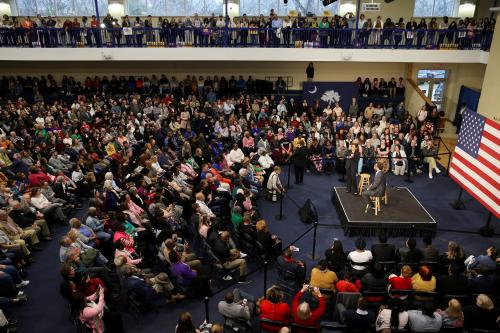
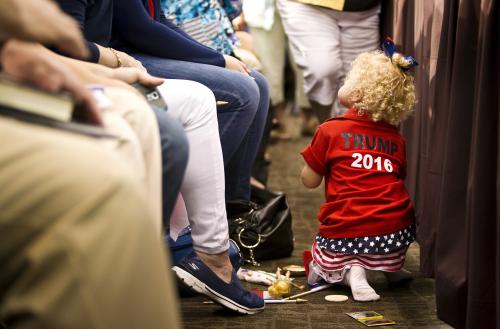

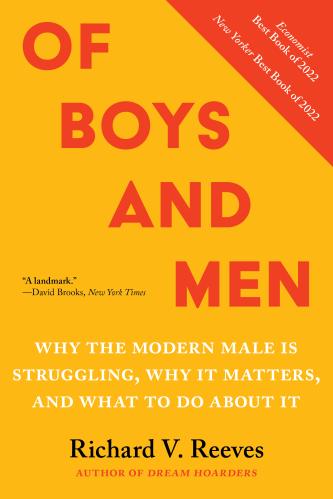
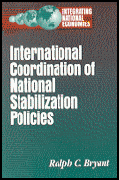




Commentary
Data point to a new wave of female political activism that could shift the course of US politics
January 10, 2018